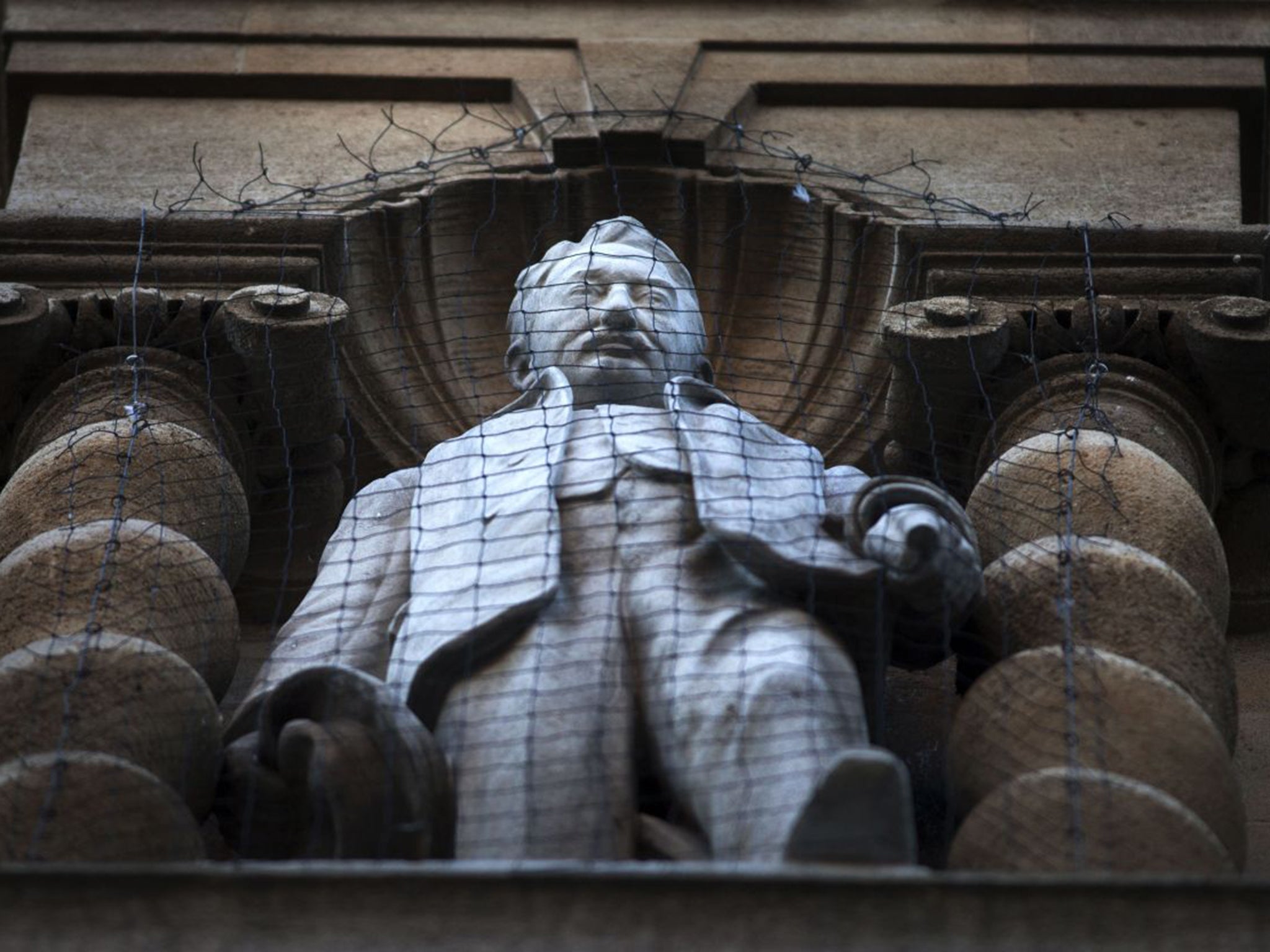Oxford University protest: Crowd of demonstrators demand removal of Cecil Rhodes statue
Crowd chants ‘Don’t be fooled, Rhodes was a racist’ as they call for removal of statue
Your support helps us to tell the story
From reproductive rights to climate change to Big Tech, The Independent is on the ground when the story is developing. Whether it's investigating the financials of Elon Musk's pro-Trump PAC or producing our latest documentary, 'The A Word', which shines a light on the American women fighting for reproductive rights, we know how important it is to parse out the facts from the messaging.
At such a critical moment in US history, we need reporters on the ground. Your donation allows us to keep sending journalists to speak to both sides of the story.
The Independent is trusted by Americans across the entire political spectrum. And unlike many other quality news outlets, we choose not to lock Americans out of our reporting and analysis with paywalls. We believe quality journalism should be available to everyone, paid for by those who can afford it.
Your support makes all the difference.Hundreds of protestors have crowded onto the street outside Oxford University’s Oriel College to call for the removal of the statue of imperialist Cecil Rhodes – the latest in a string of anti-racist action that has spread across the globe in recent weeks.
Students at the university first called for the statue of Rhodes to be brought down in 2015 – part of a multinational movement to highlight his legacy of white supremacist views and his role in paving the way for apartheid in South Africa.
Now global Black Lives Matter protests and events in Bristol – where activists removed a statue of slaver Edward Colston and flung it into Bristol Harbour – have renewed calls for action against the statue of Rhodes.
Chanting “Don’t be fooled, Rhodes was a racist” and “Rhodes must fall, take it down”, protestors – including many students at the university as well as local residents – demanded the removal of the statue, as well as a reparation scholarship aimed at people of African descent.
Ndjodi Ndeunyema, an Oxford student who is among the event’s organisers, said action in Bristol to remove the Colston statue had allowed them to “reinvigorate that conversation” that began in 2015.
“Many of the demands that we’ll present at this protest have not been satisfied,” he told The Independent. “They’ve fallen on deaf ears and it is on us to communicate clearly to the university and to the college that yes, you can kick this into the long grass but it won’t go away. Yes students will move on, but students will continue to object to the institutional practises that are symbolised by objectionable iconography such as that of Cecil Rhodes.”
Referring to the inscription beneath Rhodes describing him as a “magnificent benefactor”, he added: “There is nothing magnificent about someone who has overseen the genocide and land expropriation regime that we’ve seen in Southern Africa in particular in the beginning of the 20th century”.
Police officers remained outside the college and on its rooftop throughout the peaceful event, where cautiously spaced protesters struggled to maintain social distancing amid the ongoing coronavirus pandemic.
It comes after the home secretary Priti Patel said it was “not for mobs to tear down statues” and instead urged the public to go through the “proper channels” like local councils and mayors to remove such symbols.
However, while the decision lays with the university, local officials in Oxford have voiced support for the removal of the Rhodes statue.
In a tweet, Labour councillor Susan Brown said: “I have today written to Oriel College to invite them to apply for planning permission to remove the statue, as it is a Grade II* listed building.
“Typically, such actions are only allowed in the most exceptional of circumstances.
“But these are exceptional circumstances, and as a city council we are keen to work with Oriel to help them find the right balance between the laws that protect our historic buildings and the moral obligation to reflect on the malign symbolism of this statue.”
Mr Ndeunyema, who was also part of the original push to remove the statue, added: “Many a time we’ve heard arguments that we’re seeking to obfuscate democratic processes – we have stressed and continued to stress the use of the democratic processes to express our disgruntlement with the veneration of people such as Cecil Rhodes here at Oxford University.
“It is upon those institutions to take such matters seriously, not only in reflecting critically upon figures such as Rhodes, but also taking substantive steps to show meaningful solidarity with black lives.”
Cecil Rhodes, once the prime minister of the Cape Colony in modern-day South Africa, professed his belief that Anglo Saxons were the “first race” and that the world was improved by the colonial spread of the race. As well as the statue, the university’s prestigious Rhodes scholarship remains, boasting Bill Clinton among its alumni.

In a statement, a spokesperson for the college said it “abhors racism and discrimination in all its forms”, adding that its governing body is “ deeply committed to equality within our community at Oriel, the University of Oxford and the wider world”.
The spokesperson added: “As an academic institution we aim to fight prejudice and champion equal opportunities for everyone regardless of race, gender, sexuality or faith. We believe Black Lives Matter and support the right to peaceful protest.
“The power of education is a catalyst for equality and inclusiveness. We understand that we are, and we want to be, a part of the public conversation about the relationship between the study of history, public commemoration, social justice, and educational equality.
“As a college, we continue to debate and discuss the issues raised by the presence on our site of examples of contested heritage relating to Cecil Rhodes.”

Join our commenting forum
Join thought-provoking conversations, follow other Independent readers and see their replies
Comments